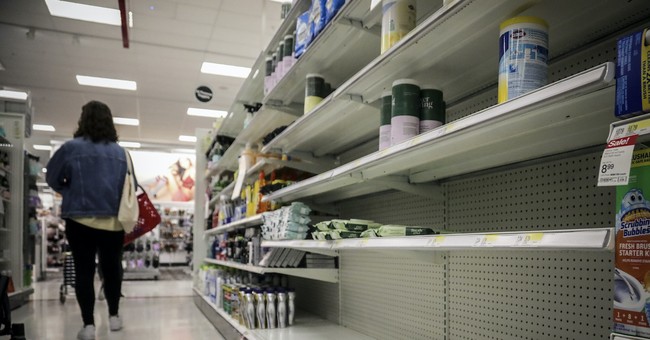Is Anyone Asking Questions During Coronavirus?

Article by Chris Stigall in "Townhall":
It gets very hard to ask questions when nearly all of the media and government and many of those you live near and work with are all wringing their hands in unison. COVID-19 or coronavirus has many scared and scrambling. But who’s asking questions beyond, “What do we do now!?”
The psychology around this virus and the way it's being covered is very strange. We know President Trump began taking action in January to mitigate travel between China and the United States. Media and health officials knew about coronavirus then. Maybe you heard a passing blip about a cruise ship, but certainly nothing like this.
Stores weren’t having runs on hand sanitizer and toilet paper in January. Or February. Or even the first week of March. Why? Because the media was talking about the Democrat’s horse race. Biden was nearly done politically. Super Tuesday was just around the corner. But coronavirus was already here and spreading fast. Likely as early as the second half of last year.
I’m prepared to suggest thousands of Americans have already contracted coronavirus, blew it off as the flu or a cold, and moved on. As they should.
Then, wham! Biden has a huge night and picks up “Joe-mentum.” Every Democrat who’d been ferociously competing for a year or more suddenly drops out at the same time and endorses Biden. Bernie gets crushed in two primary elections back to back. Then….CORONAVIRUS!
All public events cease. A near octogenarian who can’t string a cogent paragraph together is abruptly crowned the party victor well before the necessary delegates are earned to secure the Democrats’ nomination. Well before more scheduled debates. It’s just…over.
Key Democrats are suggesting the remaining schedule of the contest should simply be terminated while Biden gets to hide from public view and coast to the fall, I guess? Then there’s President Trump and his wildly popular and well-attended rallies. Gone. Over. As are all public events. Just done. In a snap.
No, I’m not making connections or crafting conspiracies. I’m simply asking you to consider where we’ve been – just days ago - versus where we are now. It’s freakishly different. When that kind of pivot-on-a-dime news happens, I like to back away and assess.
Sharyl Attkisson, host of Full Measure on the Sinclair television network spoke with me this week about the media coverage surrounding COVID-19, and, like me, she drew on history and had many more questions than answers about the level of intensity this particular event is receiving now.
When I pointed to an Associated Press story – one of the few – to report the positive news 63,000 people have contracted coronavirus, recuperated and moved on with their lives, Attkisson suggested it’s likely a far bigger number.
Think of it a different way. What if I told you a million Americans contracted coronavirus, but fewer than forty people have died from it to date. Half of those are in one community of nursing homes. Would that change your attitude about this at all? Maybe not.
But is that possible? It’s highly possible, if not probable. The more people we verify contract this virus and live to tell the tale, the mortality rate drops to ridiculously low levels. More in line with a virulent flu season.
But we’re not allowed to talk about that. You can’t even say flu and coronavirus in the same sentence lest you be accused of comparing the two or making it sound as though you’re downplaying an emergency. It’s called perspective. That’s all. And we need more of it.
Attkisson went on to talk about some very alarming viruses and illnesses she’s covered in past years that struck her as far more concerning than coronavirus. “The CDC seems to pick and choose their diseases and how much attention they give them based on what, I don’t know, but it’s not consistent.”
Attkisson lamented today’s journalists - especially medical reporters - often see themselves as cheerleaders of the medical establishment even when they’re often wrong. “Reporters act as though it’s their patriotic duty to take at face value whatever corporate medical experts say.”
When I asked her about the number of flu deaths in comparison to coronavirus in the United States, Attkisson pointed out even those numbers are inflated. As she’s reported in the past, many elderly patients who die of anything from congestive heart failure or pneumonia may still be listed as a flu death even if there’s a trace or even a hunch a flu virus is in their bloodstream.
“They overcount, some people say, flu deaths to pump up the numbers to make it look worse than it is. The reason is, if you look at CDC documents, they have an internal powerpoint that talks about how to increase demand for vaccines. Of course, our health officials and government are inextricably linked to the pharmaceutical industry…”
You can take it from there.
I know, I know. It’s heresy to ask questions of the white lab coats, but they’re just as human as our corrupt-to-the-core intelligence officials of the last few years. We’re also told not to question the “consensus of scientists” that we control the intensity of weather or that Benghazi was because of a YouTube video, or…. fill in your favorite now debunked, once inarguable “fact.” There are plenty.
“I just think you have to not take everything at face value,” Attkisson told me in conclusion. “Ask questions, be prudent, and unfortunately - get your own information and try to make up your own mind on this stuff.”
Given the empty toilet paper shelves, I’d say we have a long way to go as a nation on that.
https://townhall.com/columnists/chrisstigall/2020/03/13/is-anyone-asking-questions-during-coronavirus-n2564880




Post a Comment